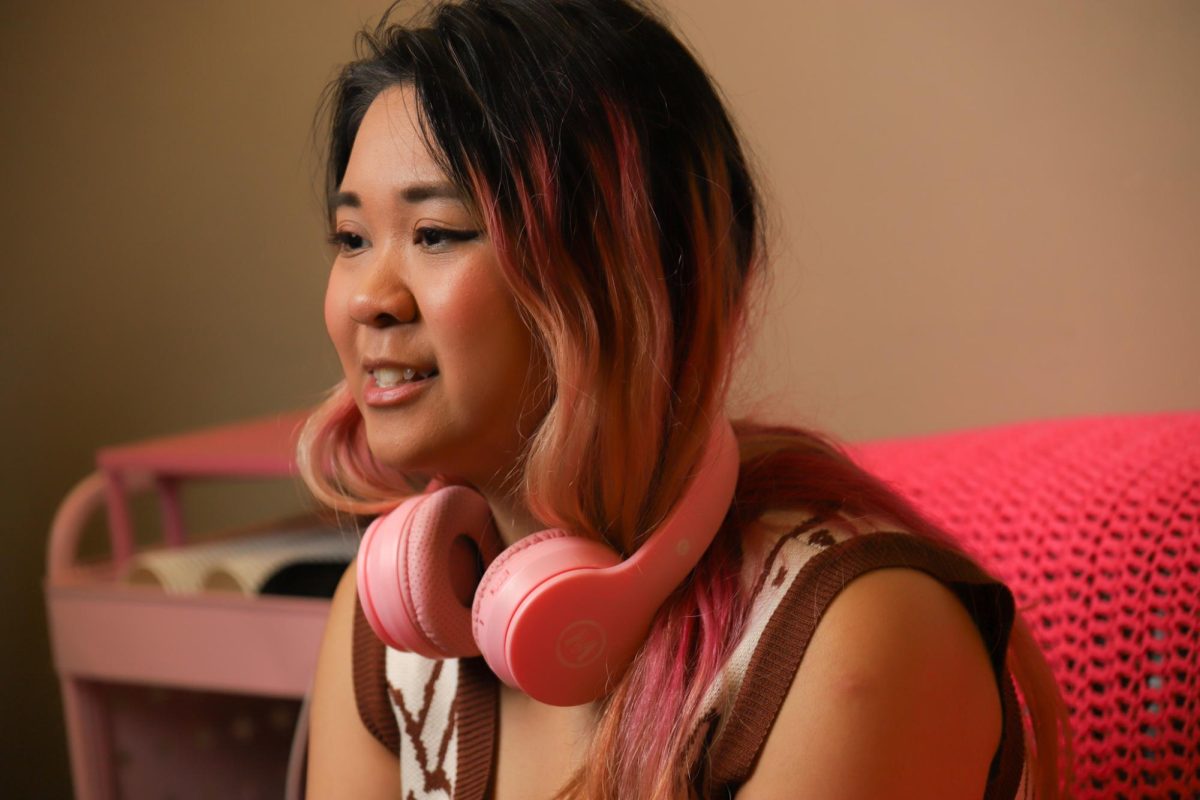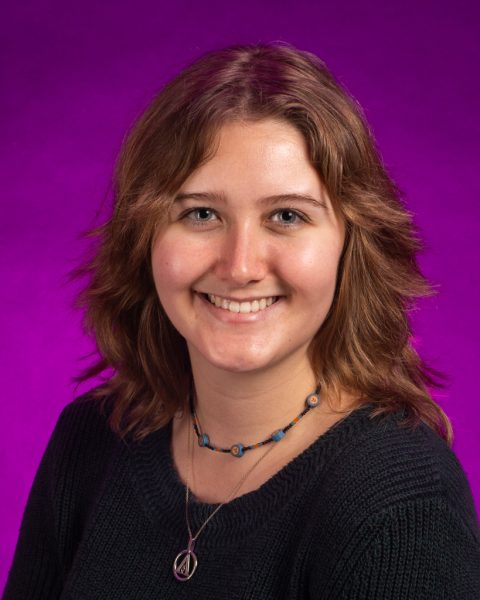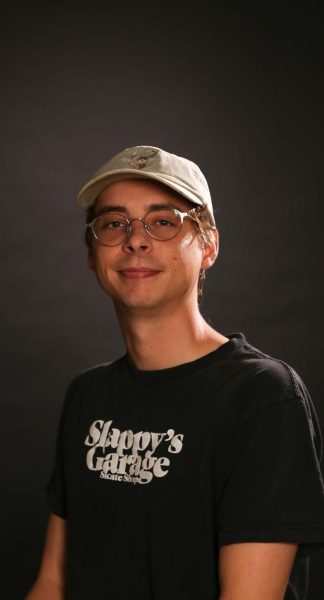For many students at SFSU, the Queer & Trans Resource Center is a place of refuge. In this cozy room on the Mezzanine Level of the Cesar Chavez Center, students can lounge on the dark green couch with a pink throw blanket on top, drop in for counseling sessions or serve themselves a bowl of ice cream from the mini fridge by the door.
Jeremy Lark, the director of the center, has one goal: to help every student who comes through the door. However, harassment on social media posts, threats, budget cuts, personnel cuts and a lack of resources make it difficult to follow through on that promise.
Since the controversial women’s sports advocate Riley Gaines came to campus last spring, the staff of the QTRC has felt under attack. Gaines, a former NCAA swimmer who tied for fifth place with transgender athlete Lia Thomas, was invited by Turning Point USA to share her views opposing the inclusion of transgender athletes in women’s sports. The event attracted protesters and Gaines had to be escorted off campus.
The QTRC hosted a queer and trans sports mixer right before Gaines spoke. Many attendees marched from one event to the next to protest. The controversy brought national attention to SFSU and put the QTRC in the crosshairs of anti-trans activists.
Anti-trans comments were posted on multiple platforms throughout the following months.
At the beginning of the fall semester, Blake Griffith, the new assistant director of the QTRC, who had recently transferred to SFSU, spotted a truck parked outside their apartment building. On the billboard affixed to the truck, they observed the faces of past QTRC leaders.
“Our first week back on campus, there was an incident where Blake heard a horn outside their apartment, while they were doing dishes, looked out, and it was one of those billboard-led trucks by Accuracy in Media again,” Lark said. “They (the person in the Accuracy in Media vehicle) got out of the car and took a picture of the car in front of Blake’s house and then got back in.”
Lark brought it up to the AS Board of Directors during a September meeting and recommended media training and civil disobedience training for students on campus. Lark said they were encouraged to take the lead on the project.
“I told them, ‘I’m glad you feel that way,’ because last semester, we got thrown to the wolves after we did everything we could to advocate for this university,” Lark said. “Since we are in this together, I would appreciate some buy-in to kind of show that that relationship is reciprocated and it was a very tense meeting that didn’t seem to go anywhere.”
TPUSA’s SFSU chapter hasn’t been active on campus this semester, but the members of the QTRC fear that TPUSA will come back in the spring as the election heats up.
Both TPUSA and Accuracy in Media did not respond to multiple requests for interviews.
“The thing is next year, or next semester is when it’s going to get big,” Lark said. “It’s going to be an election season, and it’s going to get messy. I’m certain of it.”
QTRC’s budget from Associated Students was cut from $10,570 to $8,200, leaving a $2,370 loss in funding according to a budget document Golden Gate Xpress acquired. While budget cuts have hit the whole school hard,” Lark said. “The QTRC needs funding to buy gender-affirming care items like binders, tucking tape and more.
“We counsel students through some really difficult times… and it’s not a problem to put everything on hold to take care of those needs,” Lark said. “But we can’t maintain all of our functioning while doing so. I’ve been out of binders for two weeks, and trying to get those reordered and get that process hammered out with management has meant that now students have been without this product.”
Like other QTRC staffers, Griffith said they wish that they could do more but are unable to because of limited resources.
“A lot of the advice is just like stay open and just have your door open and plan like an event a semester like one, maybe two events a semester,” Griffith said.
At the end of the last semester, Lark was made aware that out of four staff positions, only three would remain. Lark and their team found out about it the day before Pride.
Jazmine Finuliar, the Black Indigenous Person of Color coordinator, has also felt the squeeze from the budget cuts, which have left the QTRC to operate with just three student staff members.
“It’s overwhelming considering that our staff has been cut from four to three, and there’s only so much that we can do,” Finuliar said. “We have just started our internship program, but at the same time, me being a staff member, when I look at all of our responsibilities, whether it’s like larger scale or just like the immediate needs of the students, I don’t want to put that responsibility onto them, especially since I’ve been in that position before.”
Shanice Robinson-Blacknell is the senior director of culture and social justice for Associated Students. In addition to the QTRC, she oversees the Art Gallery, Richard Oakes Multicultural Center, Education Referral Organizations for Sexuality, and the Women’s Center.
“Like the art gallery, as well as the RMOC, (the QTRC) took a hit with the reduction of staffing, because those are three of my programs that operated with four people instead of three people and none of them did the same thing,” Robinson-Blacknell said. “With QTRC, originally, we had a director and assistant director, a BIPOC coordinator and an office assistant. Last semester was the first time in a long time that that program had been fully staffed.”
Robinson-Blacknell has also felt the squeeze of budget cuts around the campus and sympathizes with her program officers.
“It hasn’t affected their performance, but it has affected their self-care,” Robinson-Blacknell said. “I’m super big on self-care. If we are not mentally stable, or we’re not taking care of ourselves as individuals, it shows in our work, it shows in our academics. I see a lot of that happening across my teams.”
Robinson-Blacknell is actively looking for a full-time staff member to come in and help support her student staff. This new staff member will help oversee some of the organizations that need some extra support like the QTRC, EROS and the Women’s Center.
“I don’t know if they’ll ever be filled if I’m being honest,” Robinson-Blacknell said. “I just asked them if they could have a little patience with me because I’m not the final decision maker; I just try to advocate on their behalf, as well as my behalf.”
Although things have been hard for the QTRC, the staff believes that they are doing important work. Finuliar was previously an intern with the QTRC and has been able to grow with the program and discover her intersectionality between identities.
“I’ve had this conversation with Jeremy before, even if I have these intersecting identities, these multitudes of identities that make up who I am essentially, why do I think it’s my responsibility to carry all of that on my back,” Finuliar said. “There’s people who have similar lived experiences to me and even though they’re not 100% similar, they’re still contributing to the bigger picture of our advocacy, our stories, things that can be passed down and things that people can learn over time.”










